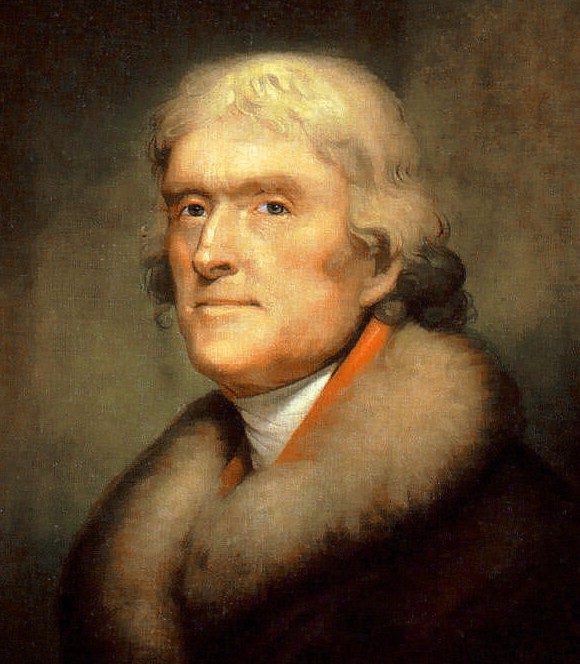Frases célebres de Thomas Jefferson
Frases de libros de Thomas Jefferson
Frases de fe de Thomas Jefferson
Variante: «El árbol de la libertad debe ser vigorizado de vez en cuando con la sangre de patriotas y tiranos: es su fertilizante natural»
Fuente: Carta con fecha del 13 de agosto de 1786 dirigida a su amigo George Wythe.
Cita con múltiples atribuciones desde al Antiguedad Clásica hasta el siglo XX.
Thomas Jefferson Frases y Citas
Fuente: Carta a Isaac McPherson, 13 de agosto de 1813.
Fuente: Thomas Jefferson to Isaac McPherson, 26 de septiembre, 2011, The University of Chicago, 1987, The Founders' Constitution, inglés http://press-pubs.uchicago.edu/founders/documents/a1_8_8s12.html,
Sobre miembros del clero los cuales trataban de lograr alguna forma de Cristianismo oficial en el gobierno de EE.UU. Carta al Dr. Benjamin Rush, 23 de septiembre de 1800.
“Es más honorable reparar un mal que persistir en él.”
Fuente: Carta a los jefes de la nación Cherokee, 1806.
Fuente: Jefferson, Thomas, Autobiografía y otros escritos, Madrid:Tecnos, 1987, página 618.
Fuente: Letter to John Taylor, 26 de septiembre, inglés http://teachingamericanhistory.org/library/index.asp?document=308,
Thomas Jefferson: Frases en inglés
“The natural progress of things is for liberty to yield, and government to gain ground.”
Letter to Edward Carrington, Paris (27 May 1788) PTJ, 13:208-9 http://www.monticello.org/site/jefferson/natural-progress-things-quotation
1780s
Fuente: Letters of Thomas Jefferson
Letter to James Madison (30 January 1787); referring to Shays' Rebellion Lipscomb & Bergh ed. 6:65
1780s
Letter to Éleuthère Irénée du Pont de Nemours (24 April 1816)
1810s
to George Logan, 1816 http://memory.loc.gov/master/mss/mtj/mtj1/049/0600/0642.jpgLetter
Posthumous publications, On financial matters
Fuente: The Papers of Thomas Jefferson: Retirement Series, Volume 10: 1 May 1816 to 18 January 1817
1780s, Letter to Peter Carr (1785)
“If you want something you have never had, you must be willing to do something you have never done.”
Not found in Jefferson's writings, according to the Jefferson Monticello center https://www.monticello.org/site/research-and-collections/if-you-want-something-you-have-never-had-quotation. First known appearance in print is from 2004.
Misattributed
1800s, First Inaugural Address (1801)
Fuente: The Inaugural Speeches and Messages of Thomas Jefferson, Esq.: Late President of the United States: Together with the Inaugural Speech of James Madison, Esq. ...
1810s
Fuente: Selected Writings
Contexto: It is agreed by those who have seriously considered the subject, that no individual has, of natural right, a separate property in an acre of land, for instance. By an universal law, indeed, whatever, whether fixed or movable, belongs to all men equally and in common, is the property for the moment of him who occupies it, but when he relinquishes the occupation, the property goes with it. Stable ownership is the gift of social law, and is given late in the progress of society. It would be curious then, if an idea, the fugitive fermentation of an individual brain, could, of natural right, be claimed in exclusive and stable property. If nature has made any one thing less susceptible than all others of exclusive property, it is the action of the thinking power called an idea, which an individual may exclusively possess as long as he keeps it to himself; but the moment it is divulged, it forces itself into the possession of every one, and the receiver cannot dispossess himself of it. Its peculiar character, too, is that no one possesses the less, because every other possesses the whole of it. He who receives an idea from me, receives instruction himself without lessening mine; as he who lights his taper at mine, receives light without darkening me.
Letter to Isaac McPherson http://press-pubs.uchicago.edu/founders/documents/a1_8_8s12.html (13 August 1813) ME 13:333.
The sentence He who receives an idea from me, receives instruction himself without lessening mine; as he who lights his taper at mine, receives light without darkening me. is sometimes paraphrased as "Knowledge is like a candle. Even as it lights a new candle, the strength of the original flame is not diminished."
“Those who expect to be both ignorant and free, expect what never was and never will be.”
Variante: If a nation expects to be ignorant and free, in a state of civilization, it expects what never was and never will be.
“Commerce with all nations, alliance with none, should be our motto.”
Letter to Thomas Lomax (12 March 1799) http://www.gutenberg.org/files/16783/16783-h/16783-h.htm#2H_4_0253|
1790s
Letter to Elbridge Gerry http://www.constitution.org/tj/jeff10.txt (26 January 1799); published in The Writings of Thomas Jefferson, Memorial Edition <!-- (ME) (Lipscomb and Bergh, editors) --> 20 Vols., Washington, D.C., 1903-04, Volume 10, p. 78
1790s
Contexto: I am for freedom of religion, & against all maneuvres to bring about a legal ascendancy of one sect over another, for freedom of the press, and against all violations of the Constitution to silence by force and not by reason the complaints or criticisms, just or unjust, of our citizens against the conduct of their agents.
“Good wine is a necessity of life for me.”
As quoted in The Man from Monticello : An Intimate Life of Thomas Jefferson (1969) by Thomas J. Fleming, p. 250
Posthumous publications
